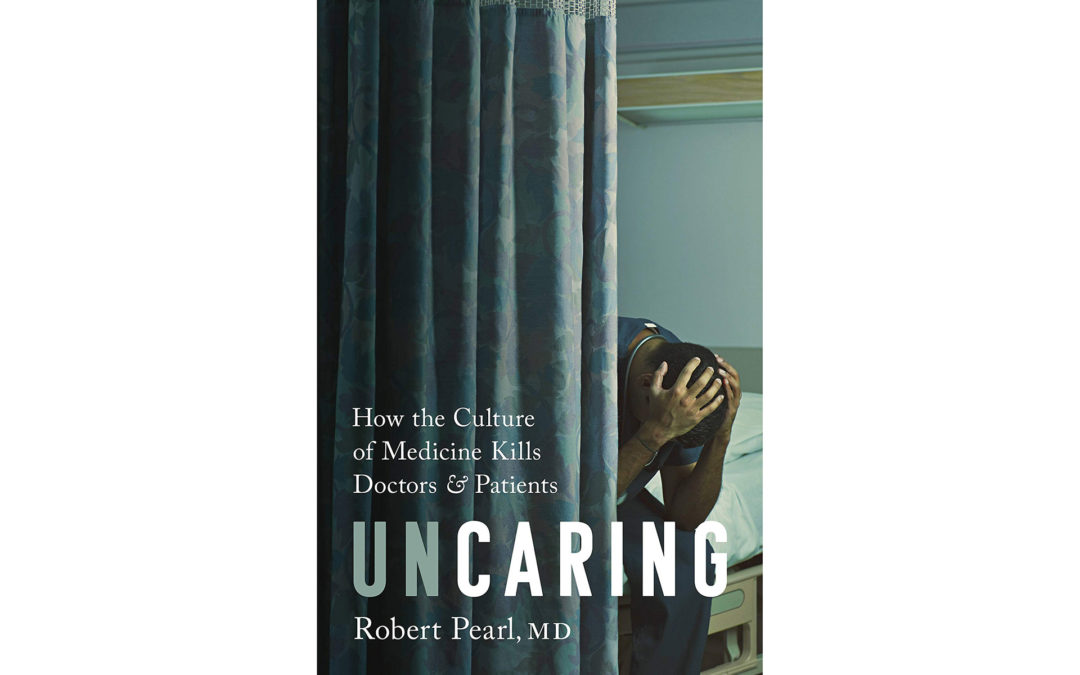I’ve been venting about my experiences with a broken healthcare system – both as a doctor and a caregiver. My friend, colleague, plastic surgeon and Renaissance man, Dr. Aron D. Wahrman alerted me to Robert Pearl’s book, Uncaring: How the Culture of Medicine Kills Doctors and Patients (a follow up to his book, Mistreated: Why We Think We’re Getting Good Health Care — and Why We’re Usually Wrong. I’ve recently talked about the experience of my friend and patient Dr. Richard Maddy, who lost both of his legs to cutaneous polyarteritis nodosa– in part because my pleas to start high dose steroids based on his clinical presentation were ignored, and my husband who died (albeit indirectly) from an adverse drug reaction that I diagnosed but for whom I could not the proper intervention from his inpatient team. It’s left me frustrated and confused at how I came to be so ineffective as a clinician or patient advocate even with “right” on my side and a naturally “pushy” personality.
Dr. Pearl explores both of these problems in our healthcare system which I will perhaps over-simplify as endemic apathy and clinical ineptitude. Here’s a link to Dr. Wahrman’s thoughtful review of Uncaring… in Plastic and Reconstructive Surgery.
“Uncaring is a critique of our health care system, which, as has been declared innumerable times, is the world’s most expensive, yet in many ways lags behind other countries in term of outcomes and quality, and thus value. Dr. Pearl ascribes a lot of this to entrenched physician culture and tradition, now out of sync with the technologic advances and consumerism we tout… The prescription of his “five C’s” as a pathway to necessary and inevitable cultural change and thus better care, is spelled out—confront, commit, connect, collaborate, and contribute (this is in tandem with the “ 4 C’s” he earlier described in Mistreated as a means to improved patient outcomes—cost, clinical excellence, coordination, and compassion)… Dr. Pearl again effortlessly weaves a narrative of hard fact, medical and political history, and moving personal anecdote. My only criticism is that I think that despite our personal and collective resilience, and adaptability, physician culture does not and has not completely functioned in a self-contained bubble, nor is it solely the product of our own “bad behaviors” and selfishness. For instance, despite embracing electronic health records, there are many tasks that are foisted on us that are low yield in terms of patient value (but are free labor in pursuit of an audit)…”
I am not sure what the way forward IS, but there’s finally a groundswell of recognition that we have a problem. Some of the problem is personal and some of it is the system we’ve created. To paraphrase Master Commandant Oliver Perry during the War of 1812, “We have met the enemy, and his is us.”
Additional Reading:
- What Happened to Us?
- Elevating the Patient Voice (Meaning, Doing the Right Thing, for Goodness Sake)
- “And I Only Am Escaped Alone to Tell Thee” – A Patient’s Experience With Excruciating Pain and Redemption
- Could Patient and Family Advisory Councils (PFACs) Help Us Fix Some of the Problems with Hospital Care?

Dr. Fife is a world renowned wound care physician dedicated to improving patient outcomes through quality driven care. Please visit my blog at CarolineFifeMD.com and my Youtube channel at https://www.youtube.com/c/carolinefifemd/videos
The opinions, comments, and content expressed or implied in my statements are solely my own and do not necessarily reflect the position or views of Intellicure or any of the boards on which I serve.



